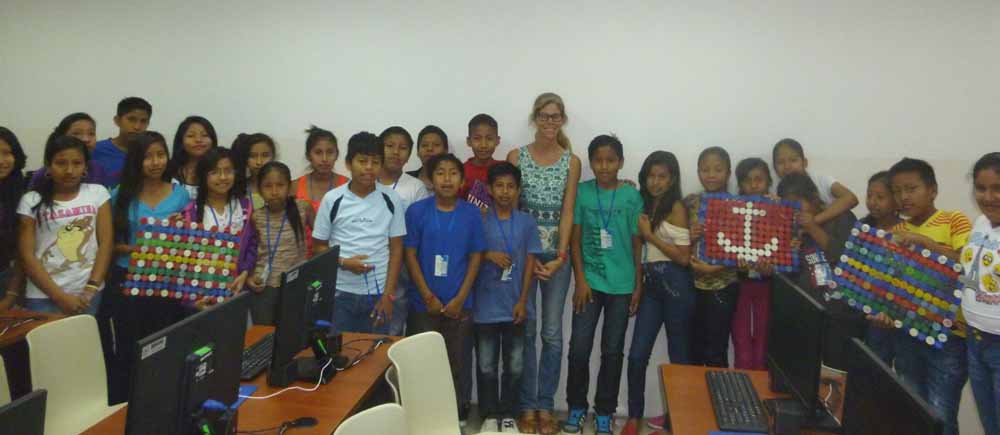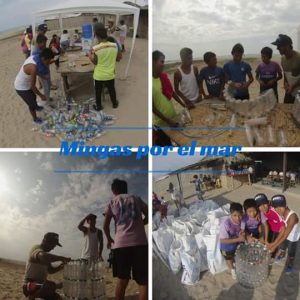 Imagine leaving your home country and migrating to a new place. Then returning full of excitement and hope but finding it full of trash, far worse than you could ever imagine. This is what happened to me in 2013 when I left Australia, where I’d been living for the last 9 years and returned to my home country Ecuador. My husband, Michael and I, spent 8 months here in 2013 and through the sadness and the frustration that we felt, an idea was born to start collecting plastic bottle tops and making mats and new things out of these to spread the message about plastic pollution in our oceans.
Imagine leaving your home country and migrating to a new place. Then returning full of excitement and hope but finding it full of trash, far worse than you could ever imagine. This is what happened to me in 2013 when I left Australia, where I’d been living for the last 9 years and returned to my home country Ecuador. My husband, Michael and I, spent 8 months here in 2013 and through the sadness and the frustration that we felt, an idea was born to start collecting plastic bottle tops and making mats and new things out of these to spread the message about plastic pollution in our oceans.
Mingas por el Mar is the name of our project. Mingas is an indigenous word that means collective work done for the benefit of the community and Mar means the Sea. With this project we’d like to motivate the Ecuadorians to take more action and take responsibility for the state of the oceans.
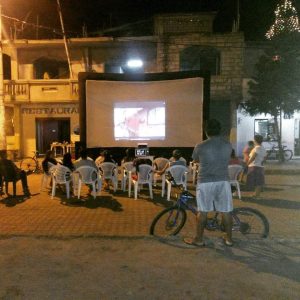 We’ve already been back in Ecuador almost a month and the campaign has already started. On 4 of December, we had our first visit to a little coastal town called Valdivia. We worked together with Javier who is a local biologist in charge of the Aquarium of Valdivia, the only place along the whole coast of Ecuador where they have basic means for rescuing marine animals. Javier is eager to create change in his community so it was of great help to us and we worked really well together.
We’ve already been back in Ecuador almost a month and the campaign has already started. On 4 of December, we had our first visit to a little coastal town called Valdivia. We worked together with Javier who is a local biologist in charge of the Aquarium of Valdivia, the only place along the whole coast of Ecuador where they have basic means for rescuing marine animals. Javier is eager to create change in his community so it was of great help to us and we worked really well together.
We spent two days in Valdivia, the first day we visited the local school and did a talk to the year 9 students. Then later at night, we showed the documentary in the centre of town and we also had a display of our collection of marine debris. There were a few interested locals who came and asked us questions and enjoyed the documentary.
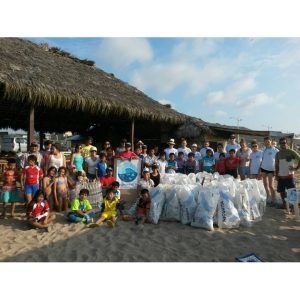 The next morning we conducted a beach cleanup. We had around 20 children from the town, 10 German volunteers that were working with Javier in the Aquarium from the organization called NGO Taxi and some other volunteers from Guayaquil and the surrounding towns.
The next morning we conducted a beach cleanup. We had around 20 children from the town, 10 German volunteers that were working with Javier in the Aquarium from the organization called NGO Taxi and some other volunteers from Guayaquil and the surrounding towns.
Together we managed to collect around 56 sacks full of rubbish and 5 of these sacks were filled with recyclable materials. A lot of the rubbish collected comes from the fishermen that out of ignorance throw everything and anything to the oceans, but it also comes from tourists and from the same communities. Waste management is still a big problem here in Ecuador and the amount of disposable plastics being used every day is enormous.
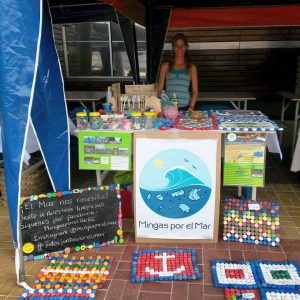 In addition to this, we were part of two fairs and one market in the city of Guayaquil, where we had a small stall with our mats and our collection of marine debris. We are trying to participate in as many things as possible because we want to spread our message loud and wide: we all need to be part of the change; we can all do something to improve this situation. We’ve also visited two universities and showed the documentary in the city’s museum of contemporary art “The Maac” and had a display of our “museum of marine debris” for people to understand through visuals our impact in the oceans.
In addition to this, we were part of two fairs and one market in the city of Guayaquil, where we had a small stall with our mats and our collection of marine debris. We are trying to participate in as many things as possible because we want to spread our message loud and wide: we all need to be part of the change; we can all do something to improve this situation. We’ve also visited two universities and showed the documentary in the city’s museum of contemporary art “The Maac” and had a display of our “museum of marine debris” for people to understand through visuals our impact in the oceans.
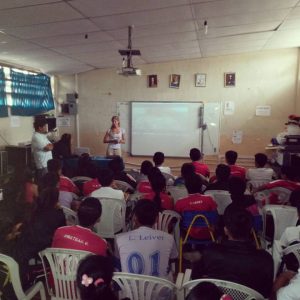 During these two months that we’ll stay in the country we are planning to visit 6 different coastal communities and spend three days in each place, visiting schools, showing the documentary Bag It, doing workshops on how to create rubbish bins using plastic bottles, how to construct mats with plastic bottle lids and organizing beach clean ups involving the communities.
During these two months that we’ll stay in the country we are planning to visit 6 different coastal communities and spend three days in each place, visiting schools, showing the documentary Bag It, doing workshops on how to create rubbish bins using plastic bottles, how to construct mats with plastic bottle lids and organizing beach clean ups involving the communities.
Starting the New Year, we’ll have a beach cleanup every Saturday of the month. The month of January is an important month because is the start of the “temporada” or the summer time in the country and also the start of the rainy season, so this is when more rubbish is produced and lots of it will end up in our oceans.
While we enjoy the Christmas holidays, we are trying to rest up and regroup as we know how busy this new year will be. We know, this is just a drop in the ocean, there is lots to be done, but if we don’t start somewhere, we will never accomplish anything. We have to start somewhere and this is our start, hoping that it will ignite change in the minds and lifestyles of many Ecuadorians.
By Isabel Romero
